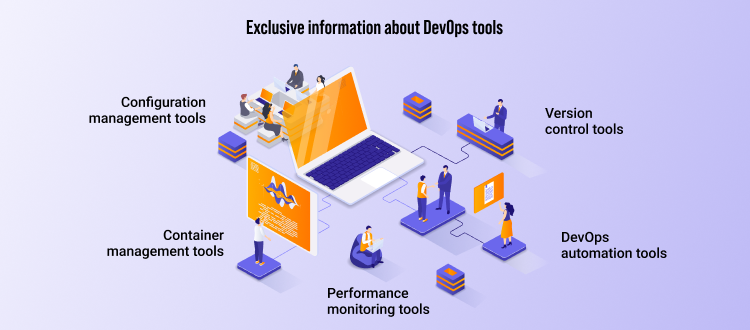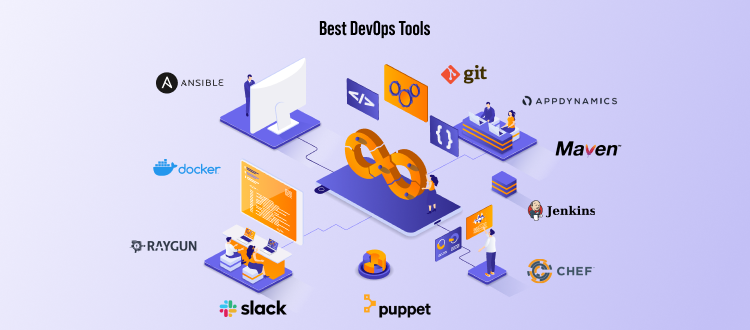The DevOps concept is an incorporation of the firm’s development and operational team. This enormous subject includes well-defined communication, efficiency, and fundamental principles of DevOps. It also permits rapid development cycles and top-notch software quality. For better practice, it is essential to adopt best DevOps tools. These tools aid multiple firms and enterprises to perform well. DevOps is an integration of relevant practices & a series of tools that enhance the capability of a company to generate and deliver apps & services at top-rated velocity. It helps in the production of top-splendid products at a rapid rate. The quality speaks more value when compared to the conventional management process. Its subjective development apps.
As DevOps tools possess multiple benefits, most companies start to execute DevOps in their typical operations. These tools aid in the eradication of obstacles in terms of communication and enhance trust throughout the company. The techies face many challenges involved in the implementation process. Hence, it is mandatory to go ahead with the DevOps process. To make an organization effective. By selecting the apt tool, the overall organizational process will be robust and scalable. In this blog, you can procure more information about different DevOps tools and their life cycle.
Deployment in DevOps
It is an overall process where you can restore essential code that is available to everyone. Here, the techies of a concerned app work on the implementation of a few features. The deployment tools update the code on a concerned server. There is a list of servers and exclusive tools to upgrade the code and restore the website. The functionality factor is explained in the upcoming points. In the initial phase of testing, the code is integrated with internal testing. In the next phase, the client test will be processed according to the needs & requirements.
Finally, the production phase takes place. In this stage, features do not get any impact due to the update of code on the cloud server. The top-rated DevOps tools process the functionality of the cloud in an efficient and convenient way for the users. It is completely different from the conventional way of discussing apps. The enhancement has provided better results to organizations and users.

Exclusive information about DevOps tools
Generally, DevOps tools are easier for organizations to eradicate. The possibility of issues and sustain continuous integration in a series of functionalities. It tackles the key views of the organization. These tools focus on the automation of the comprehensive process and implement, test, and deploy a set of substantial features. On the other side of the flip, these tools build the complete deployment process and help with enhanced implementation, optimization in operations, rapid release & innovation rate, advancement in collaboration, impeccable flow in chain process, etc. These tools play an important role in every company and support. The overall software implementation process. It is also known to be DevOps trends & techniques. The main goal of the DevOps tool is to increase teamwork or cooperation through the management and automation process. There is a list of DevOps tools. Which are described in detail in the upcoming points.
Version control tools
The Version Control tool is also described as Source Code Management. The main aim of these tools is to track the changes in the code system.
DevOps automation tools
These tools eradicate the trouble of repeatable tasks from a workflow view. Some tools are subjected to the testing/deployment process. The other tools focus on the implementation process that includes conceptualization & continual monitoring.
Performance monitoring tools
These standard tools check the performance factor and handle the complete infrastructure. For the detection of the issue, these tools use scalable reporting abilities and Artificial Intelligence.
Container management tools
In the aspect of developing software. The container is nothing but an app that is integrated with the conveyable environment. These DevOps tools possess a set of predefined libraries, frameworks, and integrated dependencies. They have the ability to monitor and optimize distributed apps.
Configuration management tools
These tools focus on two important processes. Such as checking and sustaining the functionality. It assures that both apps and services perform well.
Life Cycle
The term continuous is initiated with each level of DevOps development. It is an essential facet of DevOps. The overall infinity loop epitomizes the life cycle. During the conventional days, most companies followed the Waterfall model. As of now, they started to follow the DevOps methodologies. In the Waterfall model, each stage should be concluded before proceeding to the next stage. When issues are raised in the development stage, they will be resolved later on. While discussing the DevOps life cycle, it is completely automated. The DevOps possess an array of workflows in a repetitive implementation cycle. Here, the work is partitioned into petite batches. The monitoring and testing processes are continually processed.
Substantial key features
Generally, DevOps deployment tools possess a list of key features which are described in detail. The continual Integration achieves enhanced software quality. Configuration Management enables well-defined functioning of apps and software. The tasks are monitored in real-time. These DevOps tools possess contemporary technologies to attain better performance. The main benefits are flexibility & scalability and it is easier to execute trendier techniques. Lists of reasons to use deployment tools are rapid speed, instant delivery, continuous integration, minimal issues, enhanced reliability, optimized collaboration, 100% security, better stability, and more.
The DevOps deployment tools are popular due to their rapid development of creative products and reliable services. At the same time, these tools allow for efficient sustainability of deployments. It is essential to possess DevOps deployment tools to attain a healthy customer experience. These tools allow the programming teams of multiple firms to develop new features of particular apps without any complexity. The DevOps deployment tools are 100% cost-effective. It is mainly due to its infrastructure as code along with its automation.

Best DevOps Tools
Git
Git is one of the prominent version tools, typically used in the development field. The major characteristics of Git are collaboration & dynamism. With the aid of the Git tool, developers can maintain track of updates and changes seamlessly. If there is any mishap, the techies can use the preceding version of the code. It is congruent with different protocols like HyperText Transfer Protocol, File Transfer Protocol, and Secure Shell. Git offers multiple benefits for repository implementation projects. It possesses top-notch features which are described as GitLab, GitHub, and BitBucket. Here, BitBucket is meant for source code-enabling service. Both GitLab & BitBucket are designed for business-permitted version control.
Maven
It is one of the most significant and best DevOps tools for developing high-level projects. Maven is beyond the automation development framework. This standard tool focuses on the management of reports & documents, reliable distribution work, and final release. The coding process takes place in Java, C#, Scala, and Ruby. This tool provides multiple advantages to a list of users. The overall monitoring process takes place through automation. Maven sustains the development process which permits consistency & efficiency factors. The main benefit is that Maven provides complete project information from the scratch. It is feasible through top-notch quality documentation. Maven offers an efficient migration process and is compatible with Eclipse, Netbeans, MyEclipse, etc. It possesses multiple plugins that increase the development process.
Jenkins
Jenkins is a well-known integration Continuous Integration DevOps tool. It is the aptest tool for both interior and exterior plugin extensions. Jenkins is an open-source that is implemented in Java language. It supports a list of operating systems such as macOS, UNIX, Windows, etc. The deployment takes place on cloud-enabled platforms. It is an indispensable tool where it possesses continuous integration and delivery. Jenkins integrates nearly thousand five hundred plugins. Jenkins speaks more value for its configuration and compatibility. Additionally, it is also easier to install. Jenkins supports accelerated implementation, testing, and deployment across multiple platforms.
Chef
Chef is a prominent Configuration Management tool that controls the entire set of components of the enormous system. It possesses servers, networks, and apps and is crucial to any system. Here, the changes are tracked, executed, and controlled. In case it is not automated, Configuration Management can be resource exhausting. The chef tool implements multiple tasks such as regulatory compliance, automation, version administration, etc. The realistic example of a handy Configuration Management tool is Chef. It is one of the well-known best DevOps tools and exclusively supports cloud platforms. A chef is an open-source tool that enables the automation of infrastructure.
Puppet
Puppet is one of the exclusive open-source DevOps tools which are designed for the implementation of system configuration and management of the server. It is compatible with multiple platforms. Puppet uses Infrastructure as Code that adopts architecture, real-time UI reporting, handling of nodes, and other tasks.
Ansible
It is a popular open-source Configuration Management tool. That is used for multiple processes like automation & deployment. This tool has a great impact on infrastructure as a code. Ansible uses Secure Shell for the interconnection of push nodes. Its playbooks are implemented in YAML. Ansible is easier to learn which is executed with minimal commands. These are the readable formats.
Docker
It is one of the distinguished Container Platforms. The techies build, test and deploy apps in resource-enabled environments. Docker encompasses an execution time environment that possesses a set of libraries, configuration, and source code. This tool provides top-notch automation and 100% security. Docker depends on a set of microservices for both the implementation and deployment process. Its typical engine possesses the ability for the automation of implementation, deployment, and handling of containerized apps. This tool is consistent with Amazon Web Service, Azure, and Google Cloud Platform. It was successfully executed on several operating systems like Linux and Windows.
Appdynamics
It is an Application Performance Monitoring tool that enables power-packed performance. This typical tool offers deeper precise monitoring for different distributed apps. Appdynamics incorporates different programming languages like Java, PHP, Node.js, etc. It supports multiple servers like Amazon Web Server and Azure cloud.
Raygun
It is one of the well-defined monitoring DevOps tools that enable the techies to operate multiple functionalities of software. Raygun explores and resolves the issues. The common issues are errors, crashes, and performance problems that happen in front-end development. Raygun includes a series of programming languages like PHP, Python, Java Script, etc. On the other side of the flip, it supports multiple platforms like Jira, Slack, GitHub, etc.
Slack
It is a well-defined communication tool where it is mainly implemented in workplaces. Slack possesses multiple factors such as automation, security, user experience, etc. It offers both the free version and paid version. The paid version of features provides advanced features. It is an independent tool that possesses power-packed capabilities, efficient tracking, and file & document sharing. It is integrated with multiple platforms like Hangouts, Trello, Twitter, etc. The additional features of Slack are instant notification and seamless workflow. One can take notes easily without any hindrance. It is one of the note-worthy apps which are integrated with the engaged UI along with pre-built functionalities. The paid version offers an enormous range of integrations and huge storage space.
End note!!
To ease the challenges of software and deploying apps, multiple DevOps tools have been implemented seamlessly. These standard best DevOps tools examine every step from scratch. Right from the coding to the deployment phase, every process is handled by the DevOps tools. These tools are also involved in the detection of issues. The iteration of DevOps phases assures 100% software product quality.
The DevOps methodologies provide open collaboration. Their respective automation tools are mandatory for continuous implementation and testing processes. The above-mentioned tools are essential to adopt the DevOps methodology. Collaboration is the backbone of DevOps where the tools can support communication across the company. Just beyond the team, the DevOps tools assist collaboration across the firm. Team Tweaks is one of the leading companies that permit top-notch DevOps consulting services for potential clients. In case of any doubts or queries, you can contact our technical support team at any time.











